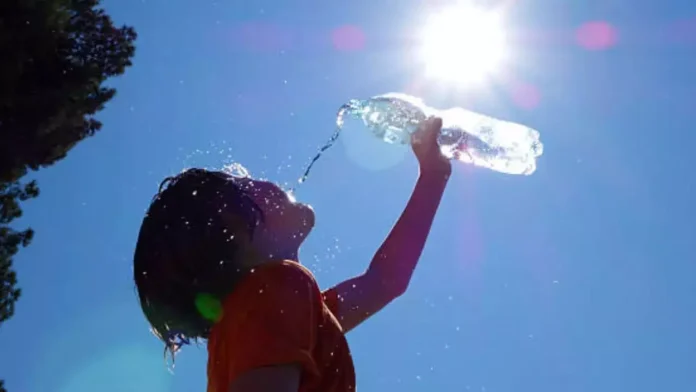A scorching heatwave has tightened its grip across North India, with temperatures soaring above 45 degrees Celsius. The Indian Meteorological Department (IMD) has issued a red alert for Sunday as Delhi sizzles under the intense heatwave conditions.
At temperatures of 45 degrees Celsius and beyond, the body’s natural ability to regulate its temperature may falter, leading to various adverse health effects. Among these, the most concerning is the risk of heat stroke. Symptoms of heat stroke include fever, confusion, dizziness, and in severe cases, even seizures. Prolonged exposure to extreme heat can cause serious damage to vital organs such as the brain and heart, posing a significant threat to health and wellbeing.
The soaring temperatures not only pose immediate health risks but can also have long-term consequences. Heatwaves can exacerbate existing health conditions, particularly for vulnerable populations such as the elderly, children, and individuals with pre-existing medical conditions. Additionally, prolonged exposure to high temperatures can lead to dehydration, heat exhaustion, and heat-related illnesses, further compounding the health challenges posed by the heatwave.
As the mercury continues to rise, it is essential for individuals to take proactive measures to protect themselves from the adverse effects of the heatwave. Staying hydrated by drinking plenty of water and avoiding prolonged exposure to direct sunlight during peak hours can help mitigate the risk of heat-related illnesses. Wearing loose, lightweight clothing and seeking shade whenever possible are also recommended strategies for staying cool and comfortable in hot weather conditions.
Authorities have urged residents to take precautions to prevent heat-related illnesses and have advised against outdoor activities during the hottest parts of the day. Additionally, community outreach programs have been initiated to provide relief to vulnerable populations, including the distribution of cold water and setting up temporary cooling shelters across the city.
While heatwaves are not uncommon during the summer months in Delhi, the severity of the current heatwave underscores the importance of proactive measures to protect public health and safety. By staying informed, staying hydrated, and taking necessary precautions, individuals can minimize the risk of heat-related illnesses and stay safe during periods of extreme heat.
As the heatwave persists, it’s crucial for individuals to recognize the signs of heat-related illnesses and seek medical attention if necessary. Heat exhaustion, characterized by symptoms such as heavy sweating, weakness, nausea, and headache, can escalate to heat stroke if left untreated. Heat stroke is a medical emergency that requires immediate medical intervention and can be life-threatening if not promptly addressed.
In addition to the physical health risks posed by the heatwave, there are also broader implications for public health and infrastructure. High temperatures can strain power grids, leading to power outages and disruptions to essential services such as air conditioning and refrigeration. This can exacerbate the already challenging conditions for individuals who are vulnerable to heat-related illnesses, particularly those without access to cooling facilities.
The economic impact of heatwaves can also be significant, with productivity levels decreasing as workers struggle to cope with the extreme temperatures. Industries such as agriculture, construction, and outdoor labor are particularly susceptible to disruptions caused by heatwaves, leading to financial losses and economic hardship for workers and businesses alike.
In response to the heatwave, authorities have implemented various measures to mitigate its impact and protect public health. Public awareness campaigns have been launched to educate residents about the importance of staying hydrated, seeking shade, and avoiding strenuous outdoor activities during the hottest parts of the day. Emergency response teams have been deployed to provide assistance to vulnerable populations, including the elderly and homeless individuals.
Efforts are also underway to enhance the city’s resilience to extreme heat events through urban planning and infrastructure upgrades. Green spaces, shade trees, and cool pavements can help reduce the urban heat island effect, mitigating the impact of heatwaves on local temperatures. Additionally, investments in climate-resilient infrastructure, such as improved access to air conditioning and cooling centers, can provide essential relief during heatwaves and other extreme weather events.
As the climate continues to change, heatwaves are expected to become more frequent and intense, posing a growing threat to public health and safety. By implementing proactive measures to adapt to and mitigate the impacts of extreme heat events, communities can better protect themselves and build resilience to the challenges posed by rising temperatures.

